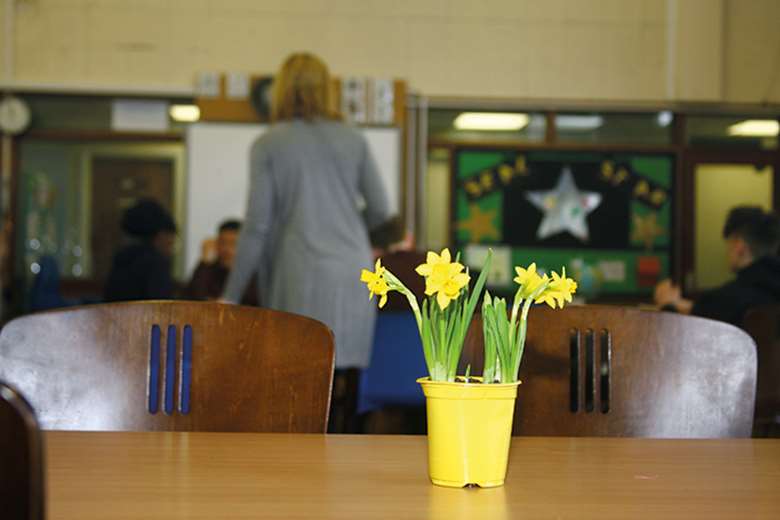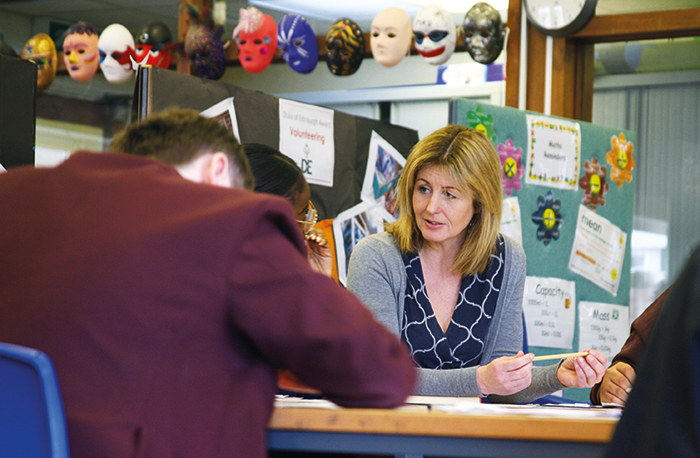Outstanding school is full of surprises
Tom de Castella
Monday, April 10, 2017
The Pendlebury Centre pupil referral unit in Stockport has just been awarded its fifth consecutive "outstanding" rating. Tom de Castella went to meet staff and pupils to find out how it achieves such success.

A white rabbit with brown spots is crouching on the lawn. We are on our way to a science lesson at the Pendlebury Centre, but this unexpected Alice in Wonderland moment makes me stop and raise a quizzical eyebrow towards deputy head Stella Hulley.
"They're very therapeutic," she explains of the three rabbits living in this central quad, known as the peace garden. "If a student comes in feeling low, often they'll sit out with the rabbits and come in feeling better."
There are many surprising things about the Pendlebury Centre. This pupil referral unit (PRU) in Stockport has been rated "outstanding" by Ofsted for five consecutive inspections, starting in 1998, with the most recent visit in January this year. "Your pupils and their families are in no doubt that your school transforms lives," the inspector wrote in the latest assessment. "For many pupils and their families, your school was their last hope." It describes the centre as a "haven" that allows pupils to "make strong progress from their different starting points, and achieve both personal and academic success which amazes their mainstream schools and parents".
PRUs do not generally get such a good press. A typical example is a Telegraph headline from 2013 warning: "Pupils being failed by poor-quality education ‘sin bins'".
Leading from the front is the dynamic figure of Janice Cahill, Pendlebury's head teacher for the past 21 years. She is all too aware that PRUs are often viewed - sometimes with justification - as a "dumping ground" for difficult students, staffed by teachers "past their shelf life". Even though that could not be further from the truth at Pendlebury, teachers still tread carefully around the PRU stigma. If they see one of their students out and about in Stockport, they do not go up and say hello. "Some of our young people don't tell their aunties and uncles they come here," Cahill explains.
So what is Pendlebury's secret? From the outside, this two-storey brick building could be any post-war educational facility. Once inside, the mood immediately lifts. Light pours into the airy hall through generous windows, the walls are lovingly decorated with colourful murals and daffodils glow in pots on the dining tables. Never is there a sense of crowding, noise or haste. It is probably the calmest school I have ever visited.
But passing through the lessons taking place this morning - science, creative writing, mindfulness and maths - a picture emerges of young people who can be painfully shy or socially awkward. The lessons are conducted in extremely small groups - today, there are between one and four young people per classroom, and a teaching assistant is often on hand to provide support to the teacher. "Mainstream schools are one-size-fits-all and a lot of our young people don't fit that model," explains Hulley. "Coming here, forming a group, for the first time they can be happy in who they are."
Mental health needs
The young people are not quite what I was expecting, certainly not the loudmouths and hard cases many would imagine a PRU to contain. There are two other PRUs in the Stockport area - Moat House for teenage mothers and Highfields for permanently excluded children. That leaves Pendlebury to work with those excluded young people who have specific mental health needs. More than half are on the autistic spectrum, many self-harm or suffer from anorexia and some may have witnessed domestic violence.
Working with families is a small but important part of what Pendlebury does. Parents often associate school with failure - a call from a teacher used to mean a ticking off. So staff at Pendlebury try to speak to parents every few days to relay positive messages about their child's progress. Cahill smiles as she recounts the story of one parent who told Ofsted inspectors: "She's a bit scary that Mrs Cahill. If she says you've got to do it, you do it." While they keep in close contact with families - in exceptional cases checking on young people during holidays - they are not social workers, she says. "If you become over-familiar with parents, that can be really bad news," she adds.
In fact, the whole philosophy of the PRU is about expecting high standards and respecting boundaries. Pendlebury is not a long-term replacement for school, but a preparation for whatever comes next. After 18 weeks, most of the young people will have gone back into a mainstream school, college or work placement. "We do say to them that Pendlebury's not real life," Cahill says. "For the children here, real life is going into large educational establishments or into work."
With that in mind, the young people wear their school uniform until it no longer fits, at which point they follow Pendlebury's own dress code. Teachers must be called "Sir" or "Miss". Phones are handed in each morning. And most of the young people are expected to go into their mainstream school regularly so as not to lose touch.
Cahill's key advice to any struggling PRU is to build close relationships with local schools and colleges. When young people arrive at Pendlebury, a contract is drawn up with the mainstream school saying what it will contribute and setting out what the PRU will do. She advises linking with a "teaching school" - strong local schools with effective leaders. She is encouraged by the education white paper which "for the first time" makes it clear that schools are responsible for excluded students. Finally, that "out of sight out of mind mentality" can be banished for good, she says.

Praise from pupils
Sunlight is streaming into the hall and around the pool table a group of young people are explaining the difference between Pendlebury and their previous school. "Cyber bullying is a big problem in mainstream schools. Teenagers are just mean," says Amber, a 16-year-old with peroxide blond hair. At Pendlebury, some of the young people have "anger issues" but there is no bullying, interjects Daniel, aged 16. They all praise the small, intimate atmosphere of Pendlebury. There are only 40 pupils here and a further five at Cedars, a small centre at the rear of the site for those with high-tier mental health needs. It is rare for everyone to be here at the same time, as every day a group of young people go out on trips - today Key Stage 3 students visited a library, tomorrow year 11 students are going to the Museum of Science and Industry in Manchester.
For some of the young people, these excursions would once have been unthinkable. "It was hard just walking out the door," says Daniel. "I couldn't go anywhere with people I didn't trust. Whereas here, I feel comfortable on the Duke of Edinburgh - I've been an hour away on a bus."
Sam, who has recently arrived at Pendlebury, smiles at his good fortune. "In my mainstream school, I was just shoved in a room every day and treated like a problem. I wasn't like everybody else," he says. He no longer dreads coming to school and enjoys the feeling that "everyone knows everyone". The consensus among the group is that by removing the fears and stresses, learning has become easier. While Amber had zero per cent attendance at her last school, she is now aiming for an A* in science.
The curriculum is narrower than at a mainstream school. On offer are maths, English, science, ICT, art and "preparation for working life". In addition, all the young people in year 11 go into school and do a GCSE the PRU does not offer. It is a personalised plan and gifted pupils are encouraged to aspire - one 15-year-old boy is doing AS-level maths.
Usually the day starts with "Forum", a gathering of the whole school for announcements, prizes and a short presentation. Today, it is taking place at the end of the day. Being Ash Wednesday, it begins with an introduction to the Christian idea of Lent, moving on to pancakes and spring. The teacher then pauses and the mood shifts: "I want you to think about something you are sorry about or somebody you would like to say sorry to." The hall goes quiet, the young people lower their heads and at this point, another side of Pendlebury emerges - as a place trying to forge young people with a sense of empathy and compassion. Then the business-like tone returns as Matt Grant, the tall, bearded assistant deputy head, gets up to announce Top Fives - prizes for those who have topped the charts for attendance and performance.
Afterwards, we step into Grant's office to discuss data, which is his responsibility and a key ingredient to keeping Pendlebury outstanding. I ask about exam results. Before giving me the figures, Grant cautions me not to expect too much. Compared with the UK average of 66 per cent of children getting five A*-C grades at GCSE, Pendlebury is a long way behind. Here, the figure is eight per cent A*-C, and 47 per cent getting five GCSEs at any grade. While academic rigour is a priority, context is important, he says. Thirteen of their 24 referrals arrived at the start of, or during, year 11, leaving little time before the exams. Often attendance at their previous school was poor or non-existent. They have to look at other things besides academic progress. On arrival, every child completes an emotional test, which offers up a resilience score. If a pupil answers the multiple choice question "I can control what happens to me..." with the word "Never", the first priority is to build up a child's sense of self again, he says.
A spreadsheet on Grant's screen - a mosaic of green, orange and red - gives an immediate picture of students' performance. You can see that attendance fluctuates throughout the year. For the first half term of the school year, it was 93 per cent, but after an influx of new students, it fell back to 75 per cent. He clicks his mouse on the details for one student who has gone from zero per cent attendance to 54 per cent and is now up to 82 per cent. I ask him whether Amber's aim of an A* in science is realistic. He looks at her profile and sees that she is predicted an A. If she works hard, she might get that star.
Daily debrief
The pupils are going home, but there is one thing left for staff - the daily debrief. If you could bottle what makes Pendlebury special, then this wide-ranging, good humoured chat about the day's events would be the place to do it. Employing the right team and demanding high standards appear to be the key final pieces in Pendlebury's jigsaw. Cahill only employs people who have at least four years' experience at a mainstream school. Last year, every member of staff sent a piece of pupils' marked work to their partner school to be moderated - to ensure marking is sufficiently strict. This summer, all of them will spend three days in a mainstream school teaching and shadowing.
In return, staff can expect to be supported. Cahill and Hulley call the debrief "passing the monkey" - the idea is staff can pass on any worries before leaving for the day. Not only does it aid solving problems, it means the entire team knows what is going on with individual young people.
Today, they discuss a girl in danger of getting into a feud with local young people, a forthcoming trip to the seaside and finally their costumes for World Book Day. It seems Jacob Marley, Cruella de Vil and Dr Jekyll and Mr Hyde will be making an appearance. Whether the young people will make the effort to dress up is less certain. In other ways, their futures are looking hopeful. Pendlebury alumni have gone on to be mechanics, nursery nurses, beauticians, architects and teachers in the past. Of the current crop, Sam wants to join the army, Amber to be a biologist and Daniel an author.
"A child does not need 10 GCSEs - no matter who tells you that, it's rubbish," Cahill argues with trademark passion. "We know that if life had been perfect, they would have gone on and achieved. What we do is open those doors collectively so they can progress." So if a young person lacks good enough grades but has the right attitude and ability, the PRU will work with local colleges to get them that place. "It's about having that second chance," concludes Cahill.

SCHOOL FACTFILE
Name of school The Pendlebury Centre PRU
Head teacher Janice Cahill (pictured above)
Funding £10,000 per student a year from the Department for Education, plus a top-up of £1,636 per pupil per year, pro rata, from Stockport Council's high needs block funding
History Opened during the 1980s, initially catering for children with additional support needs
Number of pupils on school roll 40 at Pendlebury and five at Cedars
Proportion with special educational needs 100% - almost half have an education, health and care plan
Proportion eligible for free school meals 34%
Ratio of boys/girls Currently 65% girls, 35% boys
Attendance 84%
Exclusions None
Attainment Five or more GCSEs at grade C or above - 8%. Five GCSEs at any grade - 47%. Maths GCSE at grade C or above - 21%. English GCSE at grade C or above - 8%.
Proportion entering further education 85%
Proportion entering training 15%
Proportion entering employment None
Staffing 26 members of staff, comprising teachers, teaching assistants, mental health practitioners, family workers, drama therapist, art therapists and admin staff




